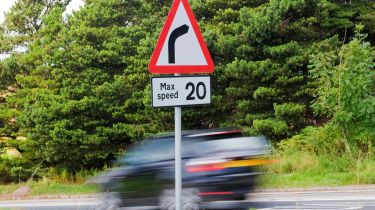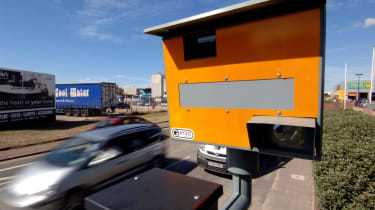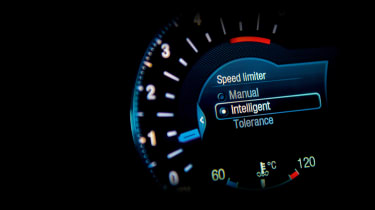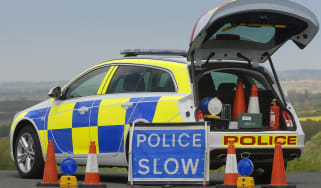Speeding fines UK 2024: how much will I have to pay?
Received a fixed penalty notice? We break down how much it’ll cost you

Receiving a speeding fine is unpleasant at the best of times. Even the most cautious of drivers can slip over the speed limit through a lapse in concentration, and as the number of speed cameras across the UK increases, so do the chances of getting caught.
New 20mph speed limits that have been recently introduced in London and urban areas of Wales and Scotland are likely to trip up drivers used to driving at 30mph – an easy mistake to make if you’re not aware of the changes or paying close enough attention. In fact, a study in 2022 by the UK Department for Transport found that 45% of cars exceed the speed limit on the motorway, while 50% regularly stray over the limit in 30mph zones.
Whether accidental or intentional, speeding is dangerous and increases the risk of a collision, as well as its severity. Speeding fines and licence points exist to deter drivers from endangering others and to keep reoffenders off the road.
In the UK, a band system is used to determine the speeding fine that an offender must pay, based on the recorded speed relative to the speed limit. As a general rule, the further over the speed limit, the higher the fine. Speeding offences of the lowest severity will usually result in a fixed penalty notice (FPN) and a minimum £100 fine.

Weekly income is taken into account, with higher earners fined more than those with low income. Fines increased in 2017 as part of a UK Government initiative to curb the number of accidents and deaths on Britain’s roads.
In this guide, we’ll explain how speeding fines are calculated, what your options are if you receive one, and how much you’ll have to pay. We’ll also detail a few handy tips for how to avoid an unwanted fine from coming through your letterbox and what will happen to the most dangerous drivers if they are caught.
How much will I be fined for speeding?
Speeding fines in the UK are split into three main categories: Band A, Band B and Band C, with A being the least severe. Most prosecuted speeding offences are likely to fall into the Band A category, which in the majority of cases will lead to a Fixed Penalty Notice (a speeding ticket). If you accept responsibility for the offence, you’ll be fined a minimum of £100 and receive three penalty points on your licence.
Alternatively, you may be offered a speed awareness course, in which case you could be spared the fine and the penalty points. Read more about speed awareness courses in our explainer.
If you plead not guilty to the offence, you will be summoned to court. If you are then found guilty, the potential fine increases to £1,000 (further increasing to £2,500 if you are caught speeding on a motorway) and you could receive a higher number of penalty points.
The table below indicates which band you’ll find yourself in, depending on how far you strayed over the limit:
|
Speed Limit (mph)
|
Recorded speed (mph)
| ||
|
|
Band C
|
Band B
|
Band A
|
|
20
|
41 and above
|
31 - 40
|
21 - 30
|
|
30
|
51 and above
|
41 - 50
|
31 - 40
|
|
40
|
66 and above
|
56 - 65
|
41 - 55
|
|
50
|
76 and above
|
66 - 75
|
51 - 65
|
|
60
|
91 and above
|
81 - 90
|
61- 80
|
|
70
|
101 and above
|
91 - 100
|
71 - 90
|
|
Points/disqualification
|
7 to 56 days disqualification or 6 points
|
7 to 28 days disqualification or 4 to 6 points
|
3 points
|
Fines are typically calculated as a proportion of the offender’s weekly income, ranging from 25-175%. A starting point is used to calculate the fine, but it can increase or decrease based on other factors, such as previous convictions or the location of the offence (e.g. near a school). The table below provides the latest figures:
|
|
Starting point
|
Range
|
|
Fine Band A:
|
50% of weekly income
|
25 – 75% of weekly income
|
|
Fine Band B:
|
100% of weekly income
|
75 – 125% of weekly income
|
|
Fine Band C:
|
150% of weekly income
|
125 – 175% of weekly income
|
As of April 2023, the Office for National Statistics revealed the median UK income to be £682 per week. As per the above table, you can expect the average speeding fine in Band A to be around £341.
For the most serious of driving offences and/or those with aggravating factors, you may be placed in Band D, E or F. These offences can include, but are not limited to: being a repeat offender or committing an offence when on bail, in bad weather, carrying passengers or a heavy load, towing or behind the wheel of a larger vehicle such as a HGV.
Falling into one of these higher bands, as you expect, will invoke an even larger fine. This can range from 200-700% of the offender’s weekly income, depending on the above aggravating factors. Regardless, the maximum fines remain at £1,000 and £2,500 for driving on public roads and motorways respectively.
What happens if I get caught by a speed camera?
If you’re caught by a speed camera, you’ll receive a Notice of Intended Prosecution (NIP) as well as a Section 172 notice. You must reply to the police within 28 days, returning the Section 172 notice and telling them who was driving the car.
If you ignore the notice, you may have to go to court. After you’ve sent the Section 172 notice, you’ll receive a Fixed Penalty Notice (FPN) or a court summons. You can challenge a speeding ticket either by writing a letter to the police informing them of why you believe you shouldn’t be fined for speeding, or by contesting the ticket in court.
What happens if the police stop you for speeding?
If the police stop you for speeding, they can also send you to court or issue you with a FPN. But, unlike a speed camera, they can also give you a verbal warning if the officer deems it appropriate.
Contrarily, straying too far over the limit could mean you could also be charged with dangerous driving; if so, the police have the right to detain you and impound your vehicle.
Can I get disqualified for speeding?
Yes, if the offence is serious enough and/or you’ve accumulated sufficient points on your driving licence, you can be disqualified for speeding. A serious speeding offence could also incur an instant driving ban for seven to 56 days, depending on the severity of the case.
Totting up 12 or more points on your licence within a three-year period usually incurs a six-month driving ban, although repeat offenders could see bans for as long as 12 or even 24 months. After three years, the points on your licence are reset to zero.
It’s also worth noting that new drivers who have only held their licence for less than two years can only accumulate six points before a driving ban is issued.
How do I pay a speeding fine?
There are several ways you can pay a speeding fine. The quickest way is to log on to GOV.UK and follow the instructions on screen – if you live in Scotland or Northern Ireland, the websites you must visit are slightly different. If you’d rather not pay online, you may also be able to do so via post – if this is an option, details regarding this should be printed on your FPN.
What if I am unable to pay the fine?
If you are unable to pay the fine in one go, it may be possible to pay it in instalments. Typically you have 28 days to accept the FPN and if you cannot source the funds in this time, you will be required to reject the fine and go to court. Here, the court may be able to set a new date in which the fine must be paid, or set up a monthly instalment order.
Be warned – going to court and pleading guilty could result in an even heftier fine, so it’s often in your best interests to pay the FPN within the original stipulated period.
Will a speeding fine affect my insurance?
Unfortunately, receiving a speeding ticket is almost certain to have a negative impact on your car insurance premium. Your insurance provider will view you as a riskier driver that’s more likely to be involved in a collision, so expect to pay a chunk more than you would have had you not been prosecuted for speeding. If you have too many driving-related convictions, some providers may refuse to insure you altogether.
How can you avoid speeding fines?
No one wants to receive a speeding fine, so while it’s fine just to say “don’t speed if you don’t want to be fined”, it can sometimes be easy to accidentally stray over the limit. Thankfully, the latest advancements in automotive technology mean several cars have features designed to prevent you from speeding altogether.

It’s worth checking whether your car has a speed limiter; a bit like cruise control, this prevents your car from surpassing a speed designated by the driver, no matter how far you depress the accelerator. Some newer cars also utilise Intelligent Speed Assistance (ISA) technology by utilising the car’s navigation system and safety cameras to automatically work out the current speed limit, without the need to input a figure manually. The navigation software found in many cars will also include the position of static speed camera locations, and provide a warning as you approach them.
Of course, another way to avoid a speeding fine is to accept an aforementioned speed awareness course if you’re offered one. These are typically only offered to first-time offenders and if you haven’t attended one in the last three years. However, completing a speed awareness course means you won’t get any points on your licence, nor will you have to pay a much heftier fine – although attending a typical course will still set you back around £85.
Want peace of mind when out on the road? Check out our list of the top 10 safest cars you can buy
Recommended

Speed awareness course: cost, who’s eligible, and how long does it take?

Driving in Germany: laws, tips and Autobahn speed limit

Speed limits in the UK: everything you need to know
Most Popular

New Smart #5 Brabus is a 637bhp far cry from the brand’s city car past

Best car leasing deals 2025: this week’s top PCH offers
Tips & advice

Car dashboard warning lights: what does each symbol mean?

Electric car charging stations: public networks, charger types, apps and maps







